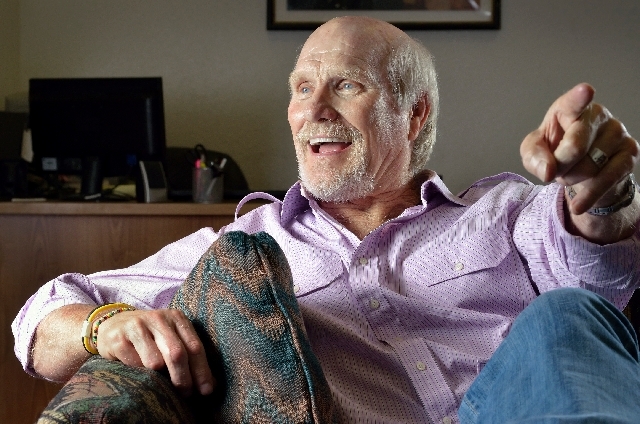Terry Bradshaw singing, sharing stories in variety show format
“I’d like to do this thing drunk. Get hammered,” Terry Bradshaw says.
Super Bowls bring one kind of pressure. Singing and telling stories about your life on the Las Vegas Strip? Altogether different.
“It’s pretty stressful, I’m not kidding around,” Bradshaw says, even though he mostly is, after wrapping a recent rehearsal for “Terry Bradshaw: America’s Favorite Dumb Blonde ... A Life in Four Quarters.”
But a bucket list is a bucket list, and the football great and veteran commentator has worked three years to tell his life story in a variety show format.
It’s all about “accepting the challenge,” he says, and “that makes me kind of feel good. I’m 64 years old and I’m still doing things for the first time. How odd is that?”
Now that his weekend of stardom at The Mirage is finally here, he can be both nervous and relieved, two moods that seem to alternate like clicks of a metronome as he settles into a sofa after a recent rehearsal at a local studio.
Almost randomly, he at one point volunteers, “I’m not worried about hecklers. I’m bigger than most of ’em.”
No argument there, TB.
At another point, he tosses out, “I don’t want to sit and dwell on how intimidating it can be, because if I do that I’ll put myself behind the eight ball. It’s gonna be fun, it’s gonna be great. ”
But, bottom line?
“There’s a lot to this. I guess I can tell you I just want to get through it, but that would be a lie,” he says. “I honestly want people walking out of here going, ‘Wow, that was a good show.’ ”
People may still be surprised that the Hall of Famer sings, though you can kick up YouTube footage of him covering “I’m So Lonesome I Could Cry” in 1976, when he still had a full head of hair and was still quarterbacking the Pittsburgh Steelers to the Super Bowl.
“My whole family on my mother’s side were singers, and I always loved to sing,” he says.
But no one doubts Bradshaw’s ability to spin a yarn, or that he has plenty of stories to tell. His show is divided into segments representing each portion of his life, with stories building up to a “relevant song,” he says.
“I don’t think people come in thinking Kenny Chesney or Garth Brooks is up there, but I will entertain ’em,” he vows. “If I know the songs and I screw up and I’m OK with it, then you’ll be OK with it. But if I screw up and I break into a nervous sweat over it, then you’ll get uncomfortable.”
He would like to keep doing this show on occasional weekends in Las Vegas, as well as take it on tour. Helping him get there is veteran show producer Anita Mann, who helms the Luxor’s topless “Fantasy” revue.
It turns out that in 1987, Mann helped Bradshaw, Marcus Allen and Bubba Smith get their groove on as Pips to Gladys Knight for a CBS special, “Super Night at the Super Bowl.”
But that connection was coincidental to variety writer Jon Macks recruiting her to help assemble a showcase for Bradshaw three years ago.
They rehearsed, but “he wasn’t ready,” Mann says. “It was really out of his comfort zone,” and physical problems from past injuries made it hard for him to get through rehearsals.
But Bradshaw lost weight, got in better shape and came back last year to try it again. “This is a game plan. I’m a coach,” Mann says she told him.
The show plays a lot like a roast, with jokes about Bradshaw’s intelligence permeating everything from the title to a quartet of backing singers dubbed “The I.Q-uties.” At one point in rehearsals, he recounts his get-rich-quick investments in ostrich eggs and racing pigeons.
“What an idiot!” he proclaims.
This all goes back to 1979 and Super Bowl XIII, when Dallas Cowboys opponent Thomas “Hollywood” Henderson taunted Bradshaw by telling reporters that he “couldn’t spell cat if you spotted him the C and the A.”
Bradshaw was thus motivated to become the game’s MVP. “Hello, how do I look from here?” he says now, pantomiming a far-away wave to Henderson.
“When I fought to defend myself because nobody would — my coaches wouldn’t, the players wouldn’t — it looked bad. It read bad, in the papers. It didn’t look good at all.”
But at what point in time did tragedy turn to years of comedy?
“I found out the best way to handle insults and personal attacks is to embrace them and to turn them into a plus instead of the negative that’s intended.
“It was easy to do because the dumb image that is labeled on me was undeserved and it was cruel, but it was something the press stayed with ... even though I called my own plays.” That fact also becomes a running reference in the show: “Just a shot at all these people who are making hundreds of millions of dollars and they don’t make any decisions.”
So now the not-so-dumb guy is sizing up his Las Vegas odds. “It’s one of those things that, if you’re successful at something you get opportunities that you don’t necessarily deserve. And I’m smart enough to know that.”
Contact reporter Mike Weatherford at mweatherford@
reviewjournal.com or 702-383-0288.
Preview
"Terry Bradshaw: America’s Favorite Dumb Blonde ... A Life in Four Quarters"
7:30 p.m. Friday-Saturday
The Mirage, 3400 Las Vegas Blvd. South
$64.84-$86.84 (702-792-7777)















